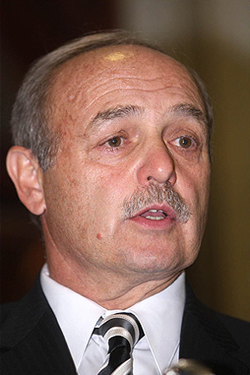How Will We Find Out?
As DiMasi goes down, COM prof wonders about the next one

Former Massachusetts House Speaker Salvatore DiMasi’s federal indictment June 2 on fraud and conspiracy charges marks the third consecutive time that the commonwealth’s speaker of the house has been indicted; the other two, Thomas M. Finneran and Charles F. Flaherty, were convicted. The temptation to make a joke about the succession of office is almost irresistible: representative, majority leader, speaker, felon, radio talk show host.
The more serious point is the strong evidence of systemic failure in the state’s legislative system. Massachusetts legislative elections are among the least competitive in the nation; incumbents run unopposed year after year. And many newly elected legislators come from a sort of farm system within the statehouse. A survey conducted by Boston University Statehouse Program reporter Jack Nicas (COM’10) found that nearly 20 percent of the state’s representatives and senators began their political careers as aides to state legislators. Indeed, the successor to DiMasi’s legislative seat was his legislative aide.
It is no surprise that this closed system gives rise to questionable behavior. There have been a series of cases where representatives and senators have strayed into the gray areas of the legislature’s relatively loosely defined and regulated ethics regulations. It can be argued that after years in the statehouse, some representatives develop a sense of power and entitlement, and ethics rules can be skirted or rationalized away. DiMasi’s claim that he has always done what’s best for the state is probably heartfelt. He has been a member of the legislature for decades. In the powerful office of house speaker, his decisions about what was best for the state could have clouded the reality that they were also good for his friends.
There is one more point to be made: the importance of the media as the public’s watchdog. It is doubtful that federal prosecutors would have taken up this case if not for the hard, often thankless spadework of both the Boston Globe and the Boston Herald. The media are the public’s eyes on Beacon Hill, but sadly, the number of reporters on the statehouse beat has been shrinking. The Cape Cod Times and the Eagle-Tribune of Lawrence are the latest to pull their reporters out of the press gallery. There are no more television reporters assigned to the statehouse as a regular beat. More media outlets have cut back statehouse staffs. The once-bustling and crowded pressroom is now a quiet, largely empty space.
A number of years ago, in an American Journalism Review article about the decline in statehouse reporting, a North Carolina state representative recounted that when she began her term as a freshman legislator, she was told by a veteran lawmaker that she didn’t have to worry about what voters back home might think, because nobody paid any attention to what was going on in Raleigh.
Without the eyes of the media, that sad statement will become true in Boston as well.
Fred Bayles, a College of Communication associate professor of journalism, is director of the Boston University Statehouse Program.
Comments & Discussion
Boston University moderates comments to facilitate an informed, substantive, civil conversation. Abusive, profane, self-promotional, misleading, incoherent or off-topic comments will be rejected. Moderators are staffed during regular business hours (EST) and can only accept comments written in English. Statistics or facts must include a citation or a link to the citation.